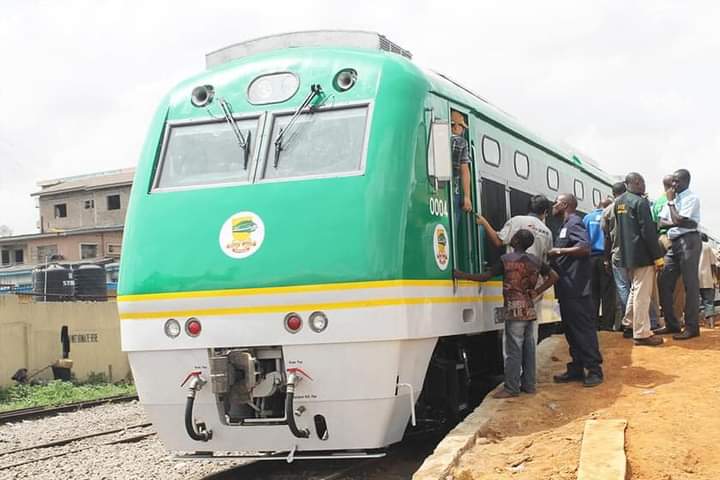What began as a celebrated step toward modern rail connectivity between the oil-rich South-South and mineral-laden North-Central regions of Nigeria is now rapidly turning into a source of fear, frustration, and a glaring example of infrastructural neglect.
The Warri-Itakpe standard gauge rail service, launched in 2020 with fanfare, was hailed as a major win for national integration and ease of transportation across Delta, Edo, and Kogi States.
But recent incidents and daily passenger experiences have painted a different picture – one of declining safety standards, poor maintenance, and a seeming disregard for the lives of Nigerian commuters.
“I feared for my life,” said Rhoda Ugboma, a regular commuter who recently took the train from Itakpe to Ujevwu. “The train stalled in the middle of nowhere for over three hours without explanation from any official of the Nigerian Railway Corporation”.
Her experience is hardly unique. In recent months, there have been multiple reports of stalled journeys, malfunctioning brakes, and a growing threat of banditry along some parts of the rail corridor.
Recall that the Nigerian Railway Corporation (NRC) had on April 10 suspended operations on the WITS route due to multiple engine failures and other technical challenges. The suspension, NRC said, was to allow for improved operational capacity and service delivery.
The Warri-Itakpe train service eventually resumed operations on April 30, and upon resumption, Thursdays were dedicated to maintenance of the tracks and rolling stock, starting May 1, 2025. Despite this, passengers continue to suffer on the train route.
Perhaps the most alarming experience yet was the January 2023 incident, where more than 140 passengers were stranded deep in a forested area between Agenebode and Itakpe after the train derailed – a chilling reminder of the 2022 Kaduna-Abuja train attack.
Over the weekend, the train returned to service with only two operational coaches after leaving passengers grounded earlier in the week. Two other coaches reportedly broke down mid-journey, compounding the hardship for commuters. “The kind of suffering people went through on Saturday is enough to shut down that train route entirely,” lamented a commuter who was aboard during the chaotic trip.
This recent development has once again forced NRC to cancel operations for Sunday, 3rd August 2025 and Monday, 4th August 2025. At the time of this report, the feature to select coaches on the WITS portal remained disabled to stop travellers from booking tickets, leaving uncertainty as to when operations will resume. No words from NRC
Another commuter added that passengers who had booked tickets online during the earlier service disruption have still not been refunded. “It’s clear that the NRC has become nonchalant, and this recurring breakdown signals deep-rooted inefficiency,” he said.
Moreover, the terrain along the rail line requires consistent and deliberate maintenance to ensure the integrity of the tracks. It would be catastrophic for a train to experience mechanical failure or derailment while navigating hilly sections. In addition, the Nigerian Railway Corporation (NRC) must take proactive steps to prevent trains from arriving at passengers’ destinations in the dead of night, which raises safety and logistical concerns.
“How can only one train be running from Itakpe to Warri back to back, and you expect efficiency? The government is quick to award contracts for runways for Airports for the rich, while poor Nigerians risk their lives, suffer from technical difficulties, hitches and train delays. Shame to those managing the system,” one frustrated traveller quipped.
Beyond maintenance and mismanagement, there are growing concerns of internal sabotage within the NRC. According to a reliable source, management at the NRC may have compromised the integrity of the corporation by enabling private transporters to poach railway passengers, thereby ensuring their business survival at the expense of public service.
“This is no longer just incompetence; it looks deliberate,” said a whistleblower familiar with internal NRC operations. “If this trend continues, passengers will be pushed back to unsafe roads, and the whole point of the Warri-Itakpe railway will be defeated”.
Meanwhile, some insiders in the NRC, who spoke anonymously, blame the situation on budgetary constraints, poor staffing, and a lack of political will to ensure consistent safety checks.
Critics say the Federal Government has been disturbingly silent on the matter, especially given the importance of this corridor that connects Warri through Abraka, Agbor, Uromi, Ajaokuta, and Itakpe, all key economic hubs.
“The government’s lack of response is disappointing. We are at the point where this can become uncontrollable,” one civic leader warned.
The Warri-Itakpe rail service once held the promise of safe, fast, and modern transport across critical Nigerian states. Today, it stands as a metaphor for national dysfunction, where lives hang in the balance of bureaucracy, sabotage, and political inaction.
ALSO READ || Highway to the grave: Warri-Itakpe Train Service, a disaster waiting to happen
Until meaningful steps are taken to overhaul its operations, provide adequate security, and ensure regular maintenance, critics argue the Federal Government is not just failing in its duty, it is, quite literally, toying with the lives of its citizens.


